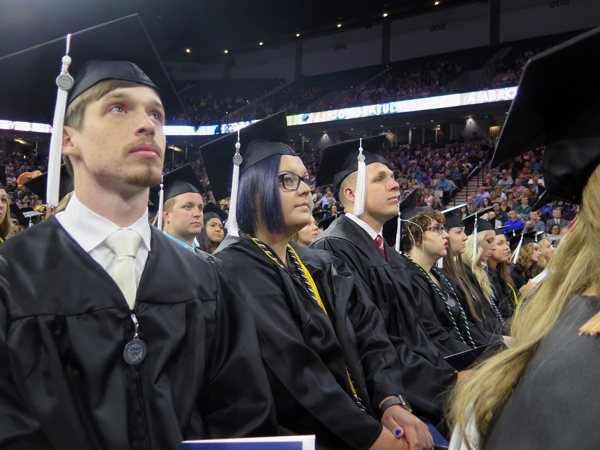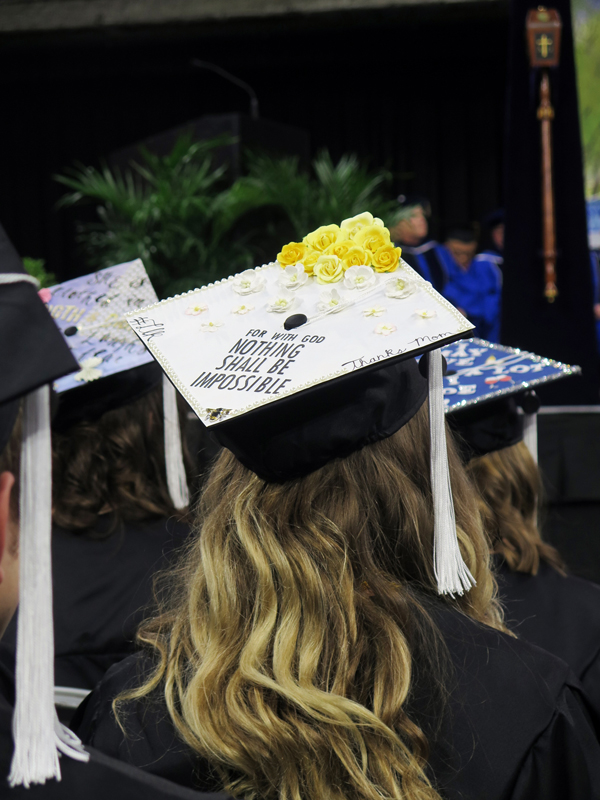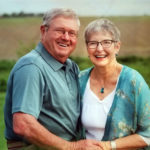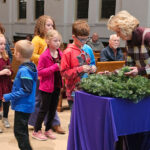By Anne Marie Amacher
The Catholic Messenger
MOLINE, Ill. — Instead of giving a traditional commencement address full of advice to graduates, Bishop Thomas Zinkula shared his thoughts on a good way to approach and live life from the perspective of stewardship. He gave his talk to St. Ambrose University students May 12 at the TaxSlayer Center.

St. Ambrose University-Davenport graduates listen to Bishop Thomas Zinkula’s commencement address May 12 at the TaxSlayer Center in Moline, Ill.
More than 450 undergraduate and nearly 160 master and doctoral students received degrees. They came from 21 states and six foreign countries. Honorary degrees were bestowed on Dr. Timothy Millea and Bishop Zinkula. Millea is a longtime supporter of Catholic education and has contributed to the development of health sciences education at St. Ambrose. He is committed to upholding the principles of Catholic faith in the sciences and practice of health care. Bishop Zinkula was recognized for his dedication to the Catholic Church and its people and his support and belief in the value of Catholic higher education.
Bishop Zinkula noted that his sister, Diane, and brother, Ken, graduated from St. Ambrose. “So I suppose it was inevitable that someday I would be connected with St. Ambrose University in one way or another. All I remember about my sister’s time at St. Ambrose is that the commencement address was given by the late comedian, Bob Hope,” the bishop said. The crowd gasped. “I can even remember where my family stood during the ceremony under the oaks. I guarantee you that my talk won’t be as funny as his was.” The crowd laughed. “And all I remember about my brother’s time at St. Ambrose is Whitey’s Ice Cream, which by that time had made its way across the river.”
The bishop said he wanted to share three pieces of advice he has learned along the way:
First, commencement speakers sometimes tell graduates that they can be and do whatever they want to be and do if they work hard enough. “This sentiment bespeaks the American Dream and I have found that it does have a certain ring of truth to it. But it isn’t totally true. I can assure you that no matter how hard I might have tried, I would never have been able to become a male ballet dancer or an opera singer.”
But he discovered that a good way to approach and live life is from the perspective of stewardship. “… Each of us does have certain talents and gifts, due to either nature or nurture, or a combination thereof. With regard to stewardship, I like to think of it as the big G and the four little g’s.”
Believers view life itself — and one’s time, talent and treasure — as gifts from God, the big G. “But one also can view these gifts as coming from and nurtured by parents, families, neighborhoods, parishes and schools. So, to begin with, our lives and everything in our lives are gifts, the first little g.” The second little g stands for gratitude. “It is essential that we be thankful for these gifts, which we don’t deserve and haven’t earned.”

Next, we should strive to grow, the third little g, the gifts we have been given. “You, the Class of 2018, have been doing this for the past two or three or four years, or however the heck long it took you to make your way through St. Ambrose! Hopefully, the development of our gifts is a lifelong endeavor.” The fourth little g is generosity. “Good stewards share with others, lovingly and generously, the gifts that have been entrusted to them.”
Bishop Zinkula said that he has found that a life of stewardship is an incredibly joyful, meaningful and satisfying manner in which to live one’s life. “A second thing that I have learned along the way is that it is helpful to approach life from the perspective of team or family.
“I have observed that in commencement addresses, graduates often are told: follow your passions, chart your own course, march to the beat of your own drummer, follow your dreams and find yourself. Such advice focuses on the individual graduate …. And yet, spiritual leaders throughout history and across the globe have emphasized that the purpose of life is not to find yourself, but to lose yourself. I have learned that it is not all about you or me. None of us is alone as we make our way through this life, and none of us is as independent as we might think we are.
“All of us are members of families in which we experience give and take and interdependence on a daily basis. When we operate as a team or a family, and everyone makes a contribution … we can do amazing things together. When we share our gifts and efforts, the outcome is always much greater than the sum of our individual contributions.”
Despite our best efforts, however, failure will happen. “As difficult as it is to have to deal with failure, thank God all of us fail from time to time. We don’t have to go looking for failure; it will find us. Difficulties and failures keep us humble, build character and provide us with opportunities to grow in resilience, virtue and depth.”
He noted that Pope Francis sometimes tells young people not to be afraid to take risks and to fail. “It isn’t the end of the world if we make a mistake or a bad decision. This is true even in a utilitarian sense. Someone found that the average entrepreneur fails almost four times before succeeding.”
The bishop concluded, “We are near the end of our annual celebration of the Easter mystery. Tomorrow we will celebrate the Solemnity of the Ascension of the Lord. Jesus’ agonizing and humiliating death on a cross appeared to be a failure. But it certainly wasn’t the end of his incredible story!
“THIS, however, IS the end of my commencement address!”











